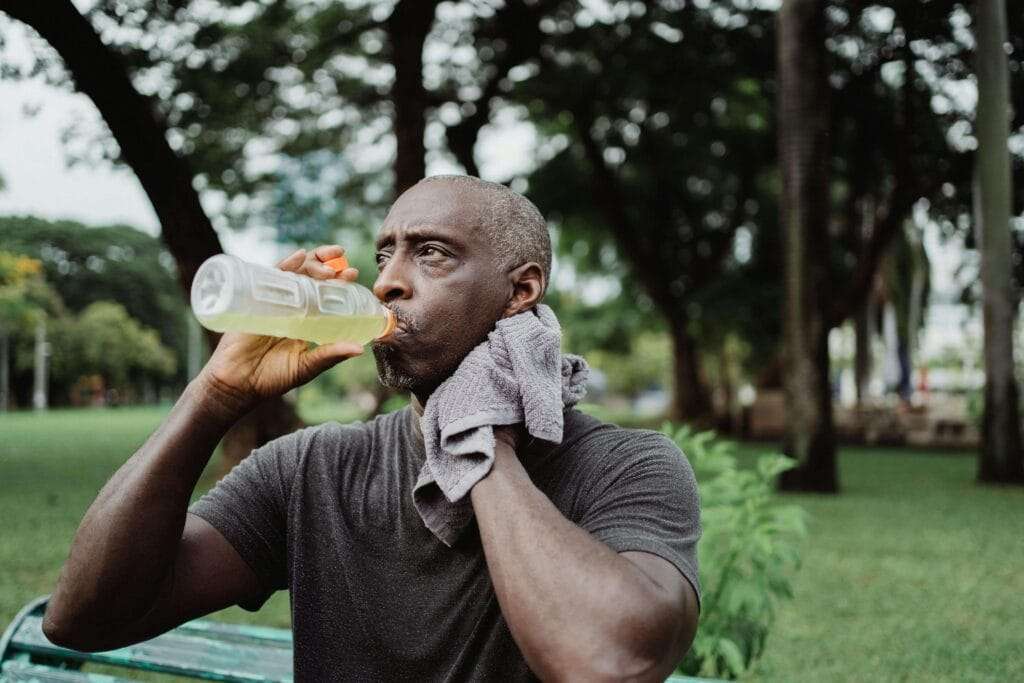Exercise Doesn’t Prevent Heart Attacks
For years the medical community has touted exercise as a preventative for heart disease. Jim Fixx had a father who died at age 43 of a heart attack, and Jim had a congenitally enlarged heart. At the age of 36, Jim became a marathon runner believing it would make his heart healthy. After much success writing books about the health benefits of running, he died of a heart attack at age 52. The autopsy revealed that atherosclerosis had blocked one coronary artery at 95 percent, a second at 85 percent, and a third at 70 percent. Exercise was not effective in preventing Jim’s heart attack.
A conversation overheard in a grocery store parking lot involved four men–in their 60s–talking about a mutual friend. One fellow declared, “Can you believe he had a heart attack and then a stroke all in the same day?” Another man continued, “Hard to believe, especially about a guy who was fit enough to run in five Iron Man Triathlons!” (The Iron Man consists of swimming 2.4 miles, biking 112 miles, and then running 26.2 miles without a rest period and a time limit of 17 hours–a grueling ordeal likely to result in dehydration.)
Recently, medical researchers declared that the strenuous exercise of marathon runners damaged heart tissue. They quickly concluded that since the heart damage occurred during heavy exercise, that makes the exercise was the cause. But another thought is that such exertion, including the Iron Man, is an ideal situation for dehydration. Not enough water means the blood is too thick, which causes the heart to work very hard at circulating it, and that strain could have caused the damage.
Why They Happen
Both heart attack and stroke are caused by a blood clot formed by cholesterol in the blood and other cells that thicken inside the arteries. Medicine says cholesterol is due to the foods we eat. In his book, the “ABC of Asthma, Allergies, and Lupus,” Dr. Batmanghelidj says cholesterol is part of the body’s drought management system. Dehydration causes the blood to become acidic so it pulls water out of the cells lining the arterial walls to dilute the acidity. These delicate cell walls are weakened by that water loss and are further damaged by the toxicity of concentrated blood, so the fast rush of blood against the arterial walls produces microscopic abrasions. Dr. Batmanghelidj says the body places cholesterol in the arteries to act as a grease gauze to prevent the artery wall from rupturing.
When the body is dehydrated, so is the blood; which causes it to flow less like water and more like molasses. There is also less blood volume so it becomes difficult for the heart to pump it past any blockage. Being thicker, the blood is more likely to grab onto the plaque, break it loose, and carry it into a vital organ such as the heart or brain.
If blood cannot flow past a blood clot, oxygen does not get to the heart or brain. Since the heart works so hard, it depends on a steady flow of oxygen-rich blood. Without oxygen, the heart goes into shock and seizes up as a heart attack. Without oxygen, brain cells die and thus some brain or bodily functions are lost because of the stroke.
Water Is a Great Preventative
Researchers at Loma Linda University tracked 20,000 people, aged 38 to 100, for the years 1973 through 1979. According to the chief researcher, Dr. J. Chan, those people who drank a mere five glasses of water per day lowered their risk of fatal coronary heart disease by 54 percent in men and 41 percent in women. Dr. Chan prefers plain water because it is absorbed quickly into the blood to prevent artery-clogging clots. Other liquids require more digestion, which draws liquids from the blood into the intestines and leaves the blood thicker. The Loma Linda study found that when coffee, tea, alcohol (being diuretics they wash water from the body) juice, or milk are the liquid of choice, they produce a 46 percent increase in heart attacks.
A 2002 American Journal of Medical Epidemiology article published a study revealing people who drank five or more glasses of plain water per day have a much lower risk (50 percent or more) of fatal coronary heart disease compared with those who drank less than two glasses each day. The benefits were not the same if five or more glasses of other fluids were ingested. This 50 percent reduction is more effective than other measures such as weight loss or exercise.
The Centers for Disease Control states that high blood pressure puts a person at risk for heart attack and stroke, the leading causes of death in the United States. In June of 2007, Bob Peterson was admitted to the hospital with a stroke and heart attack. His blood pressure at the time was 240/160 and his doctor gave little hope of his survival and told Bob’s wife to get his affairs in order. After 18 hours, the doctors had lowered his blood pressure to 194/116. Several months after his release, he began rehydration with 16 glasses of ionized water each day. On January 21, 2013, his blood pressure was 117/78. Bob continues to drink his water religiously.
Chiropractors and acupuncturists Dr. John Amaro and Dr. Debra Richel say that as many as 80 percent of Americans live in a continuous state of subclinical dehydration–and so these doctors sound the alarm about Cardiovascular Shock. This event occurs when the body becomes dehydrated, thus plunging it into a state of shock. They recommend six to eight large glasses of water each day and more for those who live in dry climates. “A water bottle should be as much a part of every working or exercising person’s equipment as their hammer, tennis racquet, or golf club.”
Continual lack of fluids during outdoor summer sports or work can lead to life-threatening dehydration. Dr. Anjali Dewan found through several researches that hot weather increases the risk of heart attack. High environmental temperatures increase sweating, which depletes the body’s water and salt necessary for hydration. It also reduces the amount of blood so the heart has to work harder, which can induce a heart attack. Since dehydration thickens the blood, it enhances the clotting process also.
Minerals Make Water Effective
George Le-Bert, a cardiologist with Baptist Health Specialists says the connection between heart health and water consumption needs to be explored more thoroughly. Some medical observers think the magic may be in the minerals. People living in areas with hard water containing calcium and magnesium tend to have fewer heart attacks. Le-Bert says “It seems these minerals have some beneficial effect on blood pressure, which can improve heart health.
Upon stirring from a stroke-induced coma, a friend of this writer immediately asked for watermelon–even as the hospital IV dripped sodium and potassium into his vein. Such a strange thing to ask for until you realize watermelon is full of water and potassium. The human body knows what it needs to rehydrate and prevent blood clots. Potassium is a simple mineral with a crucial job: one hundred thousand times a day it helps trigger the heart to rhythmically squeeze blood through the body.
Perhaps water, salt, potassium, calcium, and magnesium are the better prescription for heart and brain health.
If you have had success curing or relieving disease through rehydration, please contact JeanAnn at 828-7194.
Please also note that an astute reader questioned February’s kidney article and Anne’s eGFR of 67 being “normal.” That indeed was an unintentional misstatement. It should have said her degeneration had been reversed and that by continuing hydration, Anne hoped to move that number up and out of the disease range completely.
References:
- 1. Batmanghelidj, F. ABC of Asthma, Allergies and Lupus. Global Health Solutions. 2000.
- 2. guardian.co.uk/world/2005/dec/03/ukraine.tomparfitt
- 3. bizjournals.com/jacksonville/feature/Baptist_Medical_Center/2012/08/drinking-eater-lowers-heart-disease-riskhtml?page=all
- 4.dailyspark.com/blog.asp?post=another_reason_to_drink_water_prevent_a_heart_attack
- 5. cdc.gov/dhdsp/data_statistics/fact_sheets/fs_bloodpressure.html
- 6. iama.edu/articles/dehydration-heartattacks
- 7. aje.oxfordjournals.org/content/155/9/827


Recent Posts